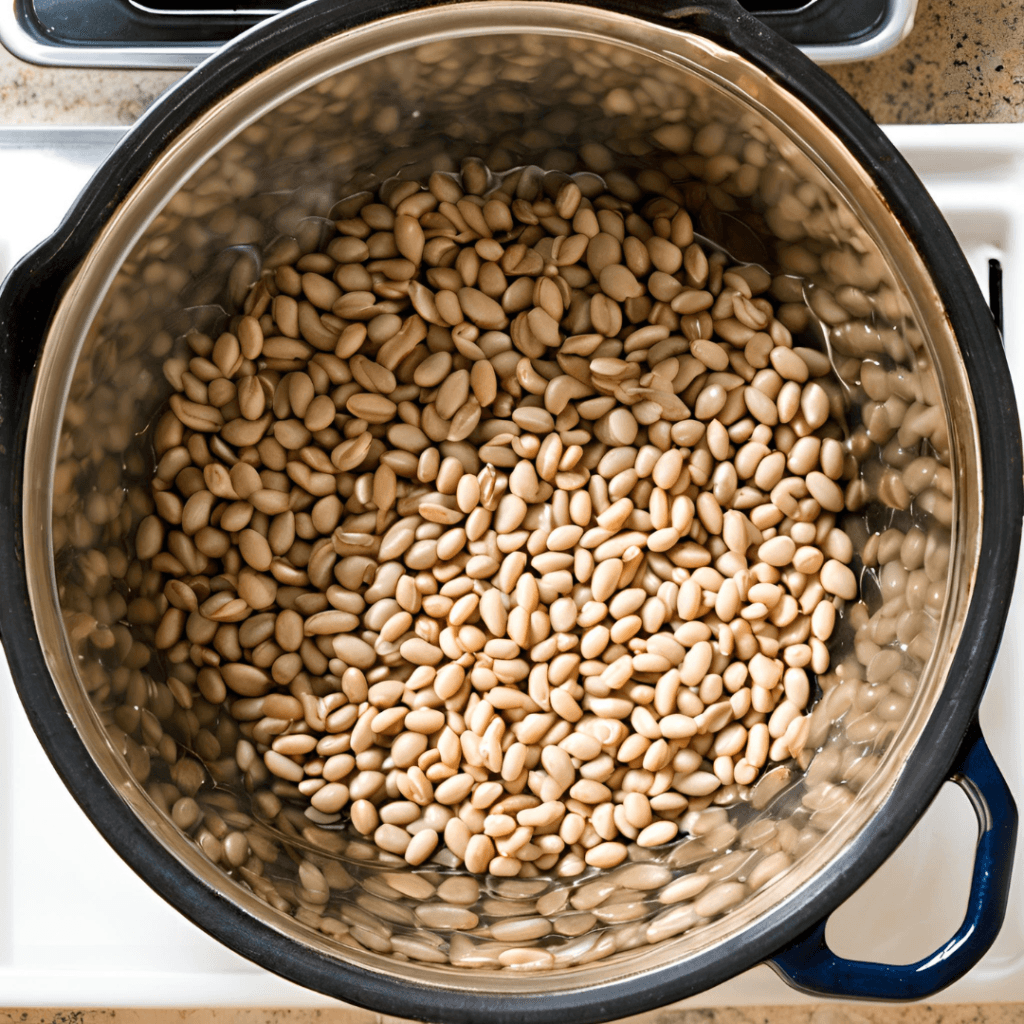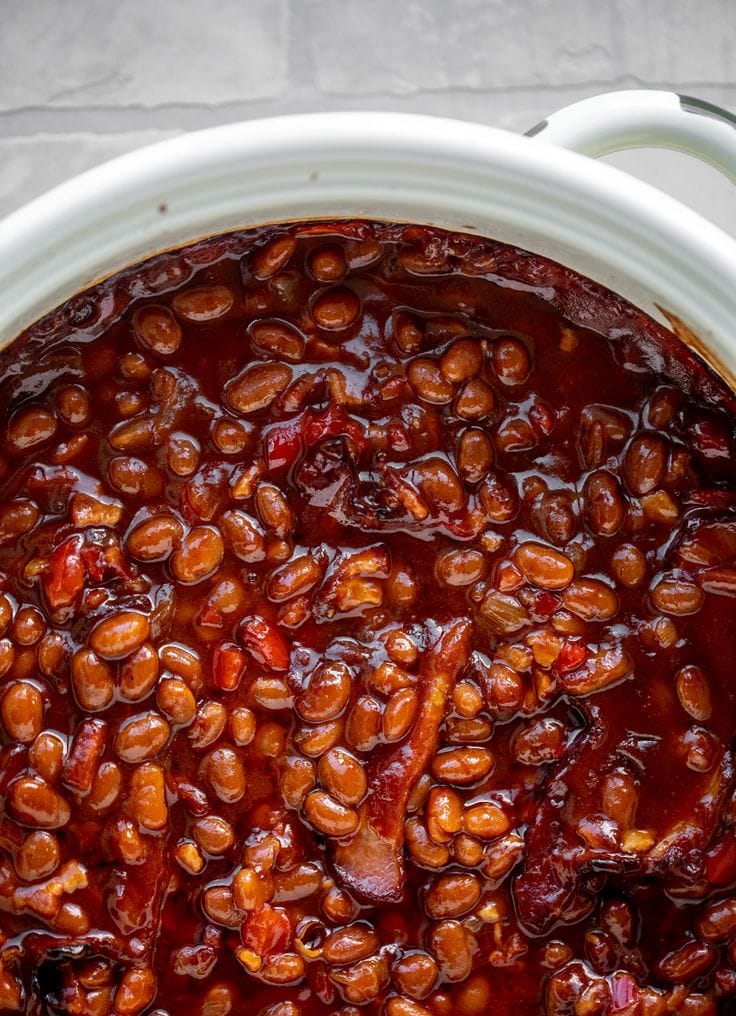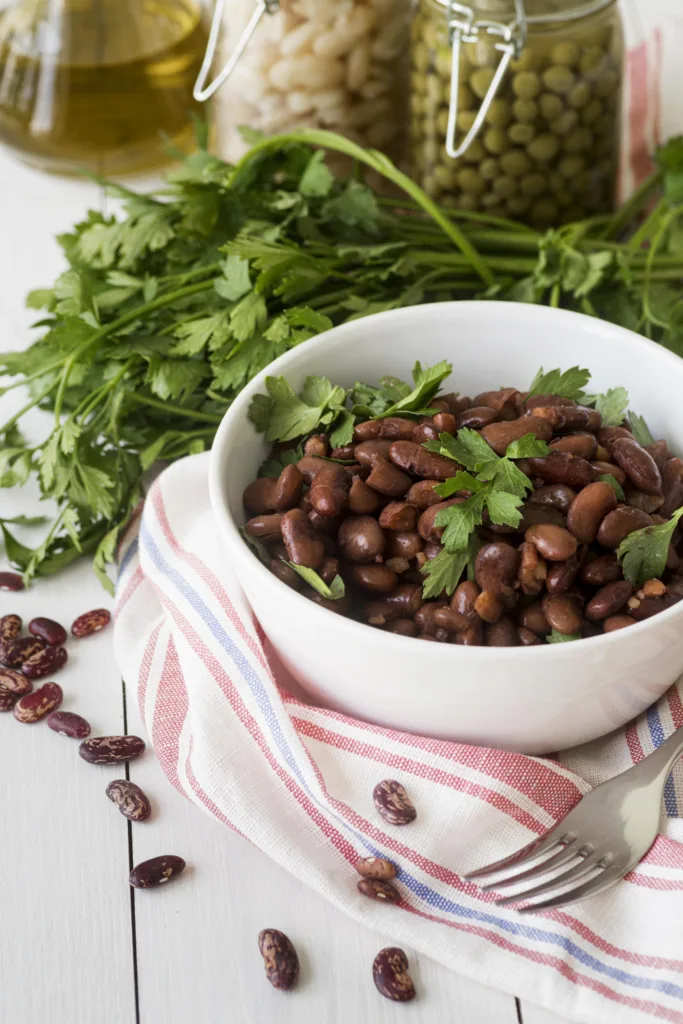The Health Benefits of Baked Beans ; Baked beans are more than just a comforting and delicious side dish—they’re a nutritional powerhouse. Loved worldwide for their savory-sweet flavor and versatility, baked beans are a staple in many households. Whether served alongside barbecue, paired with toast for a classic breakfast, or enjoyed as a standalone dish, they provide far more than just a satisfying taste.
Packed with fiber, plant-based protein, and a wealth of essential vitamins and minerals, baked beans can play a key role in promoting overall health. Their nutrient profile supports various aspects of well-being, from heart health to improved digestion. Baked beans are particularly rich in iron, magnesium, potassium, and folate, nutrients vital for energy production, bone strength, and maintaining a healthy immune system.
Baked beans
What makes baked beans even more appealing is their suitability for diverse diets. They’re naturally low in fat, making them an excellent choice for weight management and heart-healthy eating. The plant-based protein in baked beans makes them a valuable addition for vegetarians and vegans, offering an affordable, sustainable alternative to animal-based proteins.
In this article, we’ll delve into the numerous health benefits of baked beans offer, exploring how their nutritional content contributes to improved digestion, heart health, energy levels, and more. Whether you’re looking to enhance your diet or simply want to learn more about this versatile dish, baked beans have something extraordinary to offer for everyone.

What Are the Key Nutritional Benefits of Baked Beans?
When it comes to nutrition, baked beans stand out as a superfood. Here’s why:
- Rich in Plant-Based Protein
Baked beans are an excellent source of protein, especially for vegetarians and vegans. Protein is essential for muscle repair and energy production. - High Fiber Content for Better Digestion
The fiber in baked beans promotes healthy digestion, prevents constipation, and supports gut health by nourishing good bacteria. - Packed with Essential Vitamins and Minerals
Baked beans are loaded with iron, zinc, and B vitamins, which are vital for immune function and energy levels.
For more ideas on incorporating baked beans into meals, explore these one-pot meal recipes, perfect for busy nights.
The Top Health Benefits of Baked Beans
1. How Baked Beans Promote Heart Health
One of the standout health benefits of baked beans is their impact on heart health. The soluble fiber in baked beans helps reduce LDL cholesterol levels, which is crucial for lowering the risk of heart disease. Choosing low-sodium versions also supports healthy blood pressure.
2. Baked Beans and Digestive Health
The fiber content in baked beans acts as a prebiotic, feeding beneficial bacteria in the gut. This helps maintain a healthy digestive system and reduces issues like bloating or constipation.
3. Can Baked Beans Aid in Weight Management?
Yes! The combination of protein and fiber in baked beans promotes satiety, helping you feel full for longer. This makes them a great choice for anyone looking to manage their weight. For creative recipe ideas, try cooking with unexpected ingredients in dishes like these unique recipes.
4. The Role of Baked Beans in Managing Blood Sugar
Baked beans are a low-glycemic food, meaning they release energy slowly, preventing sudden blood sugar spikes. This makes them an excellent food for people with diabetes or those looking to stabilize their blood sugar levels.
5. Antioxidant Properties of Baked Beans
Baked beans contain natural antioxidants, including phenolic compounds, which help combat oxidative stress and reduce inflammation.
How to Enjoy the Health Benefits of Baked Beans
Incorporating baked beans into your diet is simple and delicious. Here are some ideas:
- Homemade Baked Beans
Control the sugar and salt content by making your own baked beans at home. - Salads and Sides
Add baked beans to salads for a protein-rich meal. - Comforting Soups
Include baked beans in soups for a hearty, nutrient-dense option.
For inspiration, explore how international flavors can elevate baked beans in global recipes.

FAQs: Addressing the Health Benefits of Baked Beans
Are Baked Beans Healthy?
Yes, baked beans are a nutritious and healthy food choice, particularly when you select low-sodium and low-sugar varieties. They are an excellent source of fiber, which promotes healthy digestion and helps regulate blood sugar levels. Baked beans are also rich in plant-based protein, making them a fantastic alternative to meat for vegetarians and vegans. In addition, they provide essential nutrients like iron, magnesium, potassium, and folate, which support energy production, strong bones, and a healthy immune system.
However, it’s important to read labels when purchasing canned baked beans, as some varieties contain added sugars and high sodium levels. Opt for reduced-sodium options or consider making baked beans at home to have better control over the ingredients.benefits of Baked beans
Can Baked Beans Cause Gas?
Yes, baked beans can cause gas, which is common with many legumes due to their content of oligosaccharides—complex carbohydrates that can be difficult to digest. When these compounds reach the large intestine, they ferment, producing gas.
To reduce this effect, consider:
- Soaking Dry Beans: If making baked beans from scratch, soak the beans overnight and rinse them thoroughly before cooking.
- Using Digestive Enzymes: Products like Beano can help break down oligosaccharides, reducing gas and bloating.
- Cooking with Spices: Adding ginger, cumin, or fennel seeds to the cooking process may help ease digestion.
Why Baked Beans Are Environmentally Friendly
Baked beans are an environmentally friendly food choice, contributing significantly to sustainable living. Beans, including those used in baked beans like navy beans and pinto beans, are a cornerstone of eco-conscious diets due to their low environmental impact compared to animal-based protein sources. Their cultivation requires minimal resources, making them an ideal food for reducing the strain on the planet.
Water and Land Efficiency
Beans are naturally resource-efficient. They use significantly less water than livestock farming and many other crops, which is crucial for regions facing water scarcity. Furthermore, they yield high amounts of protein per acre, reducing the need for large amounts of farmland. This makes baked beans a sustainable choice, especially as global populations grow and land availability diminishes.benefits of Baked beans
Natural Soil Enrichers
Beans also play a unique role in sustainable agriculture due to their nitrogen-fixing properties. As legumes, they work in tandem with bacteria in the soil to convert atmospheric nitrogen into a form plants can use. This natural fertilization reduces the reliance on synthetic fertilizers, which are energy-intensive to produce and can contribute to soil degradation and water pollution. Growing beans enriches the soil for future crops, creating a cycle of sustainability.
Low Carbon Footprint
Compared to meat production, beans have a much smaller carbon footprint. Livestock farming produces significant amounts of greenhouse gases like methane, while beans contribute minimally to emissions during cultivation. By opting for baked beans, individuals can actively reduce their carbon footprint and support a more climate-friendly food system.
Versatility and Longevity
Baked beans also reduce food waste thanks to their long shelf life. Dried beans can last for years, and canned varieties remain fresh for months. This durability minimizes the environmental impact associated with food spoilage, transportation, and waste.
By incorporating baked beans into your diet, you’re making a choice that supports the planet—reducing resource use, emissions, and waste, all while enjoying a nutritious and delicious food.benefits of Baked beans
1. Low Resource Requirements for Cultivation
Beans, including those used in baked beans (such as navy beans or pinto beans), require significantly fewer resources to grow compared to animal-based protein sources like beef or pork. They use:
- Less Water: Legumes generally need less water to grow than most crops, making them an excellent choice for water-scarce regions.
- Minimal Land Use: Beans produce a high yield per acre, meaning they require less farmland to produce the same amount of protein as animal farming.
Additionally, growing beans doesn’t involve the intensive land and water demands associated with livestock, making them an environmentally responsible protein source.benefits of Baked beans
2. Natural Nitrogen Fixers
One of the most remarkable aspects of beans is their ability to fix nitrogen naturally. Beans belong to the legume family, which has a symbiotic relationship with nitrogen-fixing bacteria in the soil. This means:
- Beans naturally enrich the soil by converting atmospheric nitrogen into a usable form, reducing the need for chemical fertilizers.
- They improve soil health for subsequent crops, promoting sustainable farming practices.
This natural fertilization process reduces the environmental impact of farming, making beans an integral part of eco-friendly agricultural systems.benefits of Baked beans
3. Low Greenhouse Gas Emissions
Compared to animal-based foods, beans contribute significantly less to greenhouse gas emissions. Producing one kilogram of beans generates a fraction of the carbon dioxide emissions associated with meat production.
- Livestock farming is a leading cause of methane emissions, a potent greenhouse gas. Beans, on the other hand, produce negligible emissions during cultivation.
- By incorporating more baked beans into meals, individuals can lower their carbon footprint while enjoying a delicious and nutritious food.benefits of Baked Beans
4. Minimal Food Waste
Beans have a long shelf life, reducing food waste compared to perishable items like meat and dairy. Dried beans can be stored for years, and canned baked beans can last for months without spoiling. This extended shelf life minimizes the need for frequent replacements, further contributing to environmental sustainability.benefits of Baked beans
5. Support for Plant-Based Diets
Baked beans are a key component of plant-based diets, which are generally more sustainable than diets rich in animal products. Producing plant-based foods requires fewer resources and generates less pollution, making it a more sustainable choice for the planet.
- A shift towards plant-based eating has been shown to reduce global environmental impacts, including deforestation, water usage, and biodiversity loss.
- By incorporating baked beans into your meals, you’re making a positive step towards reducing the demand for resource-intensive animal farming.benefits of Baked beans
6. Versatility Reduces Food Miles
Baked beans are widely grown and consumed, reducing the need for long transportation distances. Beans can be locally sourced in many regions, and canned baked beans are readily available worldwide. This accessibility minimizes the environmental cost of transporting food over long distances, known as food miles.
7. Less Energy-Intensive Production
The process of growing beans and preparing baked beans is far less energy-intensive than raising livestock or producing processed foods. The cooking and canning process for baked beans typically involves fewer steps and less energy compared to meat processing, further reducing their environmental footprint.benefits of Baked beans
How Choosing Baked Beans Helps the Environment
Incorporating baked beans into your diet isn’t just a healthy choice—it’s an environmentally conscious one. By eating more beans, you’re supporting sustainable farming practices, reducing greenhouse gas emissions, and promoting biodiversity. Choosing baked beans over meat-based protein options can help conserve precious resources like water and land while contributing to a greener planet.
As the world moves toward more sustainable food systems, baked beans stand out as a delicious and eco-friendly staple. By making them a regular part of your meals, you can enjoy great taste while making a positive impact on the environment.benefits of Baked beans
Conclusion: Embracing the Health Benefits of Baked Beans
Why Baked Beans Deserve a Place in Your Diet
Baked beans are more than just a comforting side dish; they’re a nutritional powerhouse that offers an array of health benefits. Rich in fiber, protein, and essential nutrients like potassium, magnesium, and folate, baked beans contribute to overall well-being in significant ways. Their high fiber content aids digestion, helps regulate cholesterol levels, and supports weight management by promoting a feeling of fullness. The protein in baked beans makes them an excellent plant-based option, particularly for vegetarians and vegans seeking sustainable and affordable protein alternatives.
One of the standout features of baked beans is their adaptability to different diets. Whether you’re managing diabetes, focusing on heart health, or simply trying to incorporate more plant-based foods into your meals, baked beans are a versatile and valuable addition. Their low glycemic index makes them a smart choice for blood sugar regulation, while their naturally low-fat content aligns with heart-healthy eating patterns. Additionally, baked beans’ nutrient density ensures that every serving delivers vital minerals that support energy production, immune function, and bone health.benefits of Baked beans
Maximizing the Benefits of Baked Beans
To fully enjoy the health benefits of baked beans offer, consider a few simple strategies for preparation and consumption:
- Choose Low-Sodium and Low-Sugar Varieties: When purchasing canned baked beans, read the labels carefully. Opt for versions with reduced sodium and little to no added sugars to ensure you’re reaping the health benefits without unnecessary additives. Better yet, make your baked beans from scratch to control the ingredients.
- Incorporate Digestive-Friendly Practices: For those who experience gas or bloating from baked beans, soaking dry beans overnight and rinsing them before cooking can reduce oligosaccharides that cause digestive discomfort. Cooking beans with spices like ginger or cumin can also promote easier digestion.
- Pair Baked Beans with Balanced Meals: To enhance their nutritional value, combine baked beans with lean proteins, whole grains, or healthy fats. For instance, pair them with quinoa or avocado for a balanced, nutrient-dense meal. benefits of Baked beans
benefits of Baked beans are a shining example of how simple, affordable foods can deliver profound health benefits. Whether you’re drawn to their versatility in recipes, their ability to support heart and digestive health, or their suitability for special diets, baked beans are a dish that deserves a permanent spot on your plate. Embrace their benefits and savor their goodness as part of a healthy, balanced lifestyle!



How to Order Rubber Stamps Online with a Stamp Maker
stamp creator online [url=http://www.stamp-online-maker.com]http://www.stamp-online-maker.com[/url] .
Экран для проектора с настенным креплением: стильное решение для дома
экран проекционный купить http://www.ehkrany-dlya-proektorov0.ru .
Готовые каркасные дома с долговечными и экологичными материалами
каркасные дома спб под ключ karkasnyi-dom-pod-klyuch-1.ru .
Современные каркасные дома с гарантией и высоким качеством исполнения
каркасный дом под ключ в спб цена http://spb-karkasnye-doma1.ru/ .
Казино Клубника: играйте, выигрывайте и наслаждайтесь азартом прямо сейчас
клубника казино клубника казино .
Монтаж септика: быстро, качественно и с гарантией на работы
септик москва http://www.septik-pod-kluch-moskwa.ru/ .
Affordable Custom Stamps Online: Stamp Maker for Every Need
stamp making online http://www.stampingandblogging.com .
Вывод из запоя в Самаре: индивидуальный подход и внимательное отношение
вывод из запоя недорого http://vivod-iz-zapoya-63.ru/ .
Custom Rubber Stamps Online: Fast and Convenient Solutions
online stamp design maker https://www.stampwebshop.com/ .
Как оформить пропуск на МКАД для грузовиков быстро и надёжно
пропуск на мкад для грузовых машин [url=https://propusknamkad13.ru]https://propusknamkad13.ru[/url] .
Ваш личный сантехник: качественный ремонт и устранение аварий
сантехник спб недорого [url=https://vyzov-santeh-nik-spb.ru/]сантехник спб недорого[/url] .
Как избежать штрафов: Получите пропуск на МКАД у нас!
грузовой пропуск в москву [url=https://propusknamkad111.ru/]https://propusknamkad111.ru/[/url] .
Кашированная фольга оптом с возможностью брендирования упаковки
фольга кашированная купить http://ufalaki.ru/ .
Качественная установка водоочистителей: услуги сантехника под ключ
услуги сантехника в спб http://www.vyzov-santehnika-spb-52.ru/ .
Услуги лизинга грузовых машин: финансирование, удобное для бизнеса
лизинг грузового транспорта http://gruzovye-avtomobili-v-lizing1.ru/ .
Септик под ключ: полный цикл работ от проектирования до установки
септик цена под ключ https://www.septik-pod-klych-99.ru/ .
Стоматология Архангельск: реставрация зубов любой сложности
круглосуточная стоматология в архангельске https://dentalstudio-29.ru .
Прыжки с парашютом в вашем городе: подарите себе незабываемые эмоции
прыжок с парашютом ленинградская область https://pryzhki-s-parashyutom-v-spb.ru .
Септики под ключ: современное решение для автономной канализации
септик цена под ключ септик цена под ключ .
Сглобяеми къщи с високо качество и естетика за вашето семейство
сглобяеми къщи 40 кв м https://sglobyaemi-kushti.com/ .
Магазин шин: шины высокого качества для вашего комфорта
интернет магазин шин в спб https://shiny-internet-magazin.ru/ .
Лизинг грузовых автомобилей: простой способ обновить автопарк
лизинг грузовых авто лизинг грузовых авто .
Строительство каркасных домов: выгодное решение для загородной жизни
каркасный дом под ключ в спб https://www.karkasnye-doma-v-spb-pod-kluch.ru .
Купить шину в магазине: качественные модели по доступным ценам
купить колеса в спб http://kupit-shiny-spb.ru/ .
Проект каркасного дома: индивидуальные решения для вашего участка
строительство каркасных домов спб http://karkasnye-doma-v-spb-1.ru/ .
Запчасти для ВАЗ: недорогие решения для вашего автомобиля
запчасти на ваз http://www.avtozapchasti-vaz1.ru/ .
Проектирование зданий любой сложности: доступная стоимость услуг
стоимость проектирования за м2 https://proektnye-raboty-ceny1.ru .
Строительство каркасного дома: быстро, качественно и доступно
каркасные дома спб под ключ https://www.karkasnye-doma-v-spb-pod-kluch1.ru .
Деревянные дома под ключ: проекты, цены и сроки строительства
дом деревянный под ключ цена https://derevyannye-doma-pod-klyuch777.ru/ .
Надёжные объемные наклейки: высокое качество материалов и дизайна
объемные наклейки со смолой объемные наклейки со смолой .
Экономичное строительство каркасных домов: надёжно и выгодно
каркасный дом спб https://www.karkasnye-doma-v-spb178.ru/ .
Современная наркологическая клиника: комплексная помощь пациентам
наркологическая клиника спб http://narkologicheskaya-klinika-spb-0.ru/ .
Как выбрать наркологическую клинику в СПб? Советы и рекомендации
наркологическая клиника спб https://www.narkologicheskaya-klinika-spb-1.ru .
Казино Клубника: лицензионные игры и честные условия для игроков
казино клубника зеркало https://goo.su/rcfb .
Купить камеру заднего вида для грузового автомобиля с доставкой
камера для грузовых автомобилей https://kamera-dlya-gruzovika.ru/ .
Премиум наклейки со смолой: создайте уникальный образ вашего бренда
объемные наклейки со смолой http://www.xn—–7kcbbyacb2akkclkqcl8a3dxf3b0a4b.xn--p1ai/ .
Кредит на карту без скрытых комиссий: надёжные банки для вас
кредит кыргызстан https://www.kreditkg.ru .
Купить спецтехнику у производителя: надежные машины для вашей работы
спецтехника производство и продажа http://www.proizvodstvo-spectekhniki.ru/ .
Что нужно знать перед покупкой экрана для проектора
экран проектора купить https://proekcionnye-ehkrany.ru/ .
Высокоскоростной интернет в офисе: подключение на выгодных условиях
интернет для офиса тарифы http://www.internet-v-ofis1.ru .